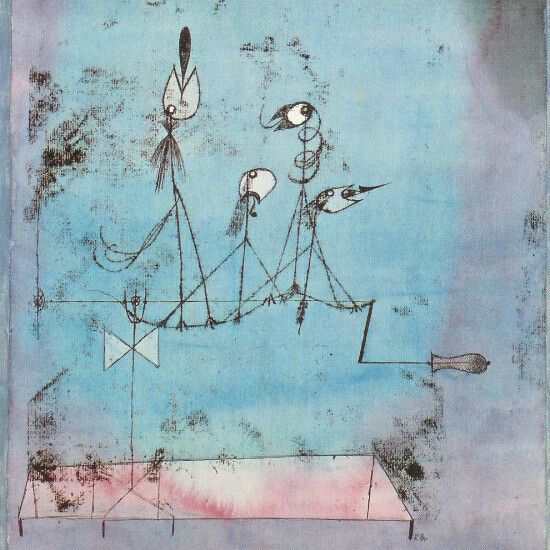&

And Your Bird Can Sing: Computational Theatre & the After-Image of Social Media is a research-based collaborative project organized by The New Centre for Research & Practice and Michael Turner and Daniel Young. This project will produce a work of experimental cinema about social media in general, Twitter in particular.
The artistic problem arises from an interest in historical transitions between media systems that continue to be understood as a fossil record’s sedimentary layers despite a shift from analog to digital. If our brain is a screen, and media a consciousness that we endlessly scroll, are we not cinematic spectators in an electropedic gyre?
We are motivated by the formal and aesthetic problem of media and time: How would 20th-century cinema understand 21st-century social media? How does social media understand cinema? We want to be better informed on how we have been re-structured globally and locally through heightened conflict mediated by algorithms that feed on publicly-shared and emotionally-charged content. Is social media the primary site of social power?
Can an interest in the production of vernaculars stemming from absurdist uses of both language and visual culture through witticisms and memes provide much-needed psychic breaks from larger narratives that consider contemporary histories as echoes of a teleological past?
These and other questions will be tackled throughout the seven sessions of this Seminar Series, which will take place on Saturdays, February 18 and 25, and March 4, 11, 18, and 25, 2023, at 10 am PST / 7 pm CET. It will provide a casual and intimate space for propositions and discussions by the guests featuring ideas and examples of social media and experimental cinema, relating to their research interests. Confirmed guests are Julieta Aranda, Hossein Derakhsan, Ganaele Langlois, Anna Longo, Reza Negarestani, and Mohammad Salemy.
Participation in the seminar series is free. To attend, please complete this form, and we will contact you soon with instructions. This form will shortlist an audience that will have the opportunity of engaging with our Guests.
For this Conference, our guests have offered abstracts that comply with the 280 character limit, immersing themselves into the constraints and temporalities of Twitter and inquiring into its capacity to evoke different effects and convey knowledge.
ABSTRACTS AND SCHEDULE
Session 1, Julieta Aranda, February 18 Cinema & social media organize our experiences of time and our desires in different trajectories. Concomitant with the disruption of Hollywood's old power dynamics, was Social Media able to usher in a new era of audience production, or is it the end of cinema as we know it?
Session 2, Hossein Derakhshan, February 25Presents a case study of two political imaginaries about protests in Iran, written on twitter between 2017-19, in a film script-style, creating pragmatic possibilities of resistance on the ground against anticipated real oppression.
Session 3, Anna Longo, March 4Twitter cannot fly. Assemblages of enunciation are products of desiring machines. Birds’ songs are expressions of territorial assemblages and movies express lines of flight. Twitter is a machine operating according to the capitalist regime of signs: can cinema teach it to fly?
Session 4, Ganaele Langlois, March 11Affect as misinformation. Misinformation provokes intense affects: anger, fear, but also detachment, among others. This Session is an invitation to look closely at the organization of affect in misinformation propagated through social media, and about the kinds of tools needed to create new modes of engaging through affect.
Session 5, Reza Negarestani, March 18"Affect Economy between brains and algorithms" aims to foreground the economy of affect in the age of social media through a synthesis between several theories of neuroscience, and a number of critical theories concerning algorithmic design and mass-entertainment.
Session 6, Roxanne Panchasi, March 25 Belgian musician Paul van Haver, aka "Stromae," is a deep-feels electro rapper/crooner & multimedia phenomenon. His 2013 song "Carmen," animated (literally) in the music video by Sylvain Chomet, is one of the most compelling visualizations of Twitter/social ever. Don't @ me.
IMAGE: Paul Klee, Twittering Machine (Die Zwitscher-Maschine), 1922, Detail.
To see The New Centre Refund Policy CLICK HERE.